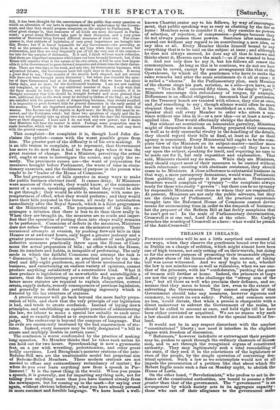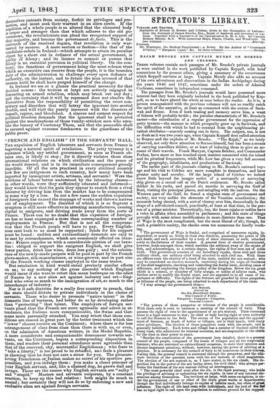TREASON IN IRELAND.
FOREIGN countries will be not a little surprised and amused at our ways, when they observe the gentlemen bound over for trial in Dublin on a charge of sedition, which might almost have been one of high treason, not only setting off on their travels, but doing so for the avowed purpose of promoting their treasonable objects. A greater abuse of the licence allowed by the custom of taking bail was never witnessed. And we may begin to ask, whether the law is not mischievous as well as ridiculous, when we see ano- ther of the prisoners, with his " confederates," pushing the game of treason still further at home. Indeed, the prisoners at large are not the only persons who challenge the "strong arm of the law," but all those as well who proclaim their defiance, and an- nounce that they mean to break the law, even to the extent of subverting the Government. They cannot complain if that Government should take any measures, however rigorous and summary, to secure its own safety. Policy, and common sense no less, would dictate, that when a person is chargeable with a direct endeavour to subvert the Government of the realm, he should be called to account at once, and held tight till he have been either convicted or acquitted. We see no reason why such a law should not at once be enacted for the special benefit of Ire- land.
It would not be in any respect discordant with the amplest "constitutional" liberty; nor need it interfere in the slightest degree with freedom of discussion. Reformers," however indefinite or extravagant their projects may be, profess to speak through the ordinary channels of discus- sion, and to act through the recognized organs of constituted authority. They may legitimately seek a total remodelling of the state, if they seek it in the convictions of the legislature or even of the people, by the simple operation of converting doc- trinal opinion. Such a law as we contemplate would not at all impede the presentation of a petition like that about which Sir Robert Inglis made such a fuss on Monday night, to abolish the House of Lords.
On the other hand, " Revolutionists," who profess to act in de- fiance of the constituted authorities, are bound to possess a force greater than that of the government. The " government" is an arrangement by which society acts in its aggregate capacity : those who cast off their allegiance to the government make themselves outcasts from society, forfeit its privileges and pro- tection, and must seek their warrant in an alien circle. If the condition of a whole people is so altered that the alienated body is larger and stronger than that which adheres to the old go- vernment, the revolutionists can plead the recognized support of that majority, and become the government de facto. This is the rationale of the received dogma, that revolution is only war- ranted by success. A mere section or faction—like that of the candidate-rebels in Ireland—which attempts to attain its peculiar object by a short cut in defiance of the actual government, is Amity of felony ; and its licence to commit or pursue that felony is no essential provision in political liberty. On the con- trary, the functions of government being the moat solemn trust which an executive can receive from the people, it is the bounden duty of the administration to challenge every open defiance of authority, on the instant, and to detain the man accused of that treason until he shall have purged himself of the charge. In Ireland we see at a glance the practical necessity for that decided course : the traitors at large are actively engaged in fomenting an armed rebellion, which may break out any day ; and the certainty that it will be repressed does not absolve the Executive from the responsibility of permitting the overt con- spiracy and disorders that will betray the ignorant into mortal trouble, and will visit the purely innocent with the disasters of tumult, rapine, and bloodshed. A sincere and earnest respect for political freedom demands that the ignorant shall be protected against the machinations, of those vanity-stricken men who emu- late the lunacy of Courtenay Thom, and that the peaceable shall be secured against excesses foreknown to the guardians of the public peace.



























 Previous page
Previous page